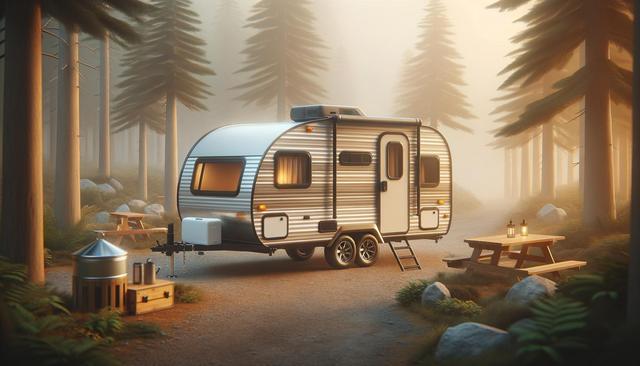Why Choose a Compact Camping Trailer?
Compact camping trailers are gaining popularity among outdoor enthusiasts who seek a balance between mobility and comfort. These trailers are designed to be lightweight and towable by a variety of vehicles, making them accessible to a wider range of campers. They are ideal for both weekend getaways and extended road trips, especially for those who prefer minimalism and simplicity over large RV setups. Their compact size also makes them easier to store and maneuver, especially in tight camping spaces or off-grid locations.
The appeal of compact camping trailers lies in their ability to offer the core comforts of home—such as a sleeping area, basic kitchen setup, and storage—without the complexities of a larger camper. For many, this means more focus on the travel experience and less time spent on setup and maintenance. In addition, compact trailers often come with customizable options, allowing owners to tailor the interior to their specific camping style and needs.
Some common benefits include:
- Ease of towing with small SUVs or crossovers
- Lower fuel consumption compared to larger RVs
- Faster setup and breakdown at campgrounds
- Increased access to remote or restricted sites
Key Features to Look For
When shopping for a compact camping trailer, it’s important to consider the features that align with your camping goals. While each model varies, certain components can enhance the usability and comfort of your trailer. A well-designed compact trailer should maximize space utilization and offer durable materials that withstand outdoor conditions. Look for layouts that include convertible sleeping areas, efficient storage solutions, and weather-resistant construction.
Other valuable features include:
- Pop-up roofs or expandable sections for added headroom
- Built-in solar panels or connections for off-grid power
- Integrated water systems with sinks or outdoor showers
- Compact kitchens with stoves, mini-fridges, or prep space
Interior layout is also an important consideration. Some trailers offer open floor plans that create a sense of space, while others may include dedicated sections for cooking, sleeping, and relaxing. Depending on your travel preferences and the number of people in your group, the layout can make a significant difference in overall comfort and functionality.
Comparing Compact Trailers to Other Options
Compact trailers stand out when compared to other camping solutions, such as tents, camper vans, or full-size RVs. While tents are lightweight and easy to carry, they lack protection from the elements and offer minimal comfort. On the other hand, full-size RVs provide luxury amenities but can be expensive, difficult to park, and limited in where they can travel. Compact trailers offer a middle ground—more comfort than tents and more flexibility than large motorhomes.
Compared to camper vans, compact trailers have the advantage of being detachable. This allows campers to set up base at a site and explore nearby areas using their towing vehicle. This separation of living and driving spaces can be particularly useful for day trips or running errands during longer stays.
Here are a few comparisons to consider:
- Cost: Compact trailers are generally more affordable than RVs
- Maintenance: Fewer mechanical parts mean lower upkeep
- Versatility: Easier to use for spontaneous trips and varied terrains
- Storage: Smaller footprint makes off-season storage simpler
Tips for First-Time Buyers
If you’re considering investing in a compact camping trailer for the first time, it’s helpful to start with clear expectations and careful planning. Begin by evaluating how you plan to use the trailer—weekend trips, cross-country tours, or seasonal camping can all influence the features you’ll need. Also, assess your towing vehicle’s capacity to ensure compatibility with the trailer you’re eyeing.
A few practical tips include:
- Research different models and read user reviews
- Attend local RV shows to explore options in person
- Rent a similar trailer to test the experience before buying
- Check local regulations on trailer towing and parking
Budget planning is also essential. While compact trailers are typically more affordable than larger units, additional costs like insurance, maintenance, and accessories should be factored into your decision. Investing in quality gear and accessories, such as a reliable hitch system or weatherproof awning, can also enhance your overall camping experience.
Maintaining and Storing Your Trailer
Proper maintenance and storage of your compact camping trailer will extend its lifespan and ensure it’s ready to go whenever adventure calls. Routine inspections, especially before and after trips, are key to identifying wear and tear. Check tires, lights, seals, and connections regularly to avoid unexpected issues on the road.
When not in use, storing your trailer in a covered or weather-protected area can prevent damage from the elements. If space is limited, many compact trailers are designed to fit in standard garages or can be stored in small driveways. Using a breathable cover can also shield your trailer from dust and UV rays.
Maintenance tips include:
- Clean the exterior and interior after each trip
- Lubricate moving parts such as stabilizers and hitches
- Drain and sanitize water systems to prevent buildup
- Inspect the roof and seals to prevent leaks
Regular upkeep not only protects your investment but also ensures a safer and more enjoyable camping experience. Keeping a maintenance log can help track service intervals and remind you of seasonal tasks.







